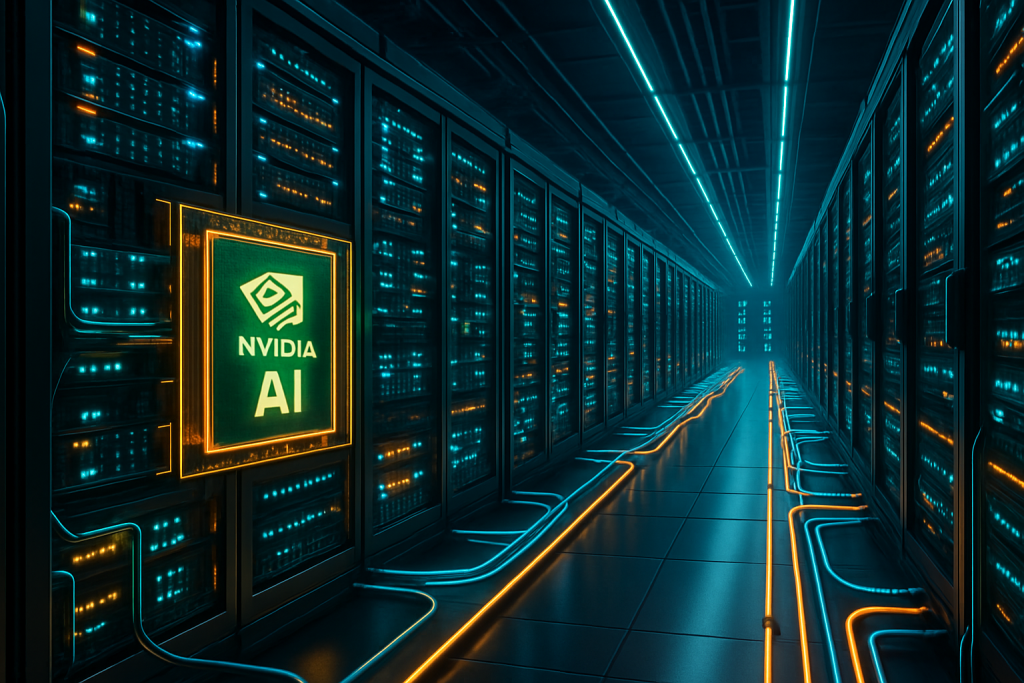The year is 2025. Flying cars are still a distant dream, but something far more transformative is taking shape: industrial-grade artificial intelligence, poised to revolutionize manufacturing as we know it. Yesterday, the tectonic plates of the tech world shifted as Deutsche Telekom and Nvidia announced a landmark partnership to build Europe’s first industrial AI cloud, right in the heart of Germany. Think of it as Skynet, but instead of world domination, it’s focused on optimizing your car’s production line. (Hopefully.)
The announcement, hot on the heels of a closed-door meeting between Nvidia CEO Jensen Huang and German Chancellor Friedrich Merz, signifies more than just a business deal. It’s a strategic play, a digital land grab, and a bold statement about Europe’s ambition to not just participate in the AI revolution, but to lead it. For years, Europe has watched as the US and China sprinted ahead in the AI arms race. Now, armed with German engineering prowess and Nvidia’s silicon muscle, Europe is flexing its own AI biceps.
So, what exactly are Deutsche Telekom and Nvidia cooking up? Imagine a massive, interconnected network of servers, powered by a staggering 10,000 Nvidia chips. That’s the engine of this AI cloud. Nvidia, the undisputed king of GPUs and AI accelerators, is providing the raw computational horsepower. Deutsche Telekom, the telecommunications giant, is building and managing the data centers, handling the operational logistics, and, crucially, developing the AI solutions themselves. They’re not just building the highway; they’re building the AI-powered vehicles that will drive on it.
Think of it like this: Nvidia is providing the finely tuned Formula 1 engine, and Deutsche Telekom is building the entire pit crew, track, and racing team. It’s a comprehensive, end-to-end solution designed specifically for the needs of European manufacturers. This isn’t just about running existing AI models; it’s about creating new ones, tailored to the unique challenges and opportunities of European industry. It’s about building a bespoke AI atelier, ready to craft solutions for everything from optimizing supply chains to predicting equipment failures.
The implications are far-reaching. For years, European manufacturers have struggled to keep pace with their global competitors, often citing a lack of access to cutting-edge technology and talent. This AI cloud promises to level the playing field, providing European companies with the tools they need to innovate, automate, and ultimately, compete. We could see a resurgence of European manufacturing, driven by AI-powered efficiency and innovation. It’s a chance for Europe to reclaim its industrial mojo, to become a global powerhouse not just in luxury goods and high-end engineering, but also in the AI-driven industries of the future.
But it’s not all sunshine and roses. The project raises some serious questions about data security, privacy, and the ethical implications of widespread AI adoption. Who controls the data generated by this AI cloud? How will it be used? And how do we ensure that AI is used to create jobs, not eliminate them? These are questions that policymakers, businesses, and citizens alike need to grapple with. It’s a real-world scenario ripped straight from the pages of a William Gibson novel.
Consider the financial impact. Nvidia’s stock price undoubtedly saw a bump after the announcement. Deutsche Telekom is positioning itself as a leader in the burgeoning AI cloud market. And the German economy, already the largest in Europe, is poised to benefit from a wave of AI-driven innovation. But the real winners could be the smaller and medium-sized enterprises (SMEs) that make up the backbone of the European economy. These companies, often lacking the resources to invest in their own AI infrastructure, could gain access to powerful AI tools through this cloud, democratizing access to a technology that was once the exclusive domain of large corporations.
This initiative also taps into the ongoing global debate about digital sovereignty. For years, European leaders have expressed concerns about their reliance on US and Chinese tech giants. This AI cloud represents a concerted effort to build European digital independence, to create a homegrown AI ecosystem that is not beholden to foreign powers. It’s a move that could inspire other regions to follow suit, leading to a more fragmented, but perhaps also more resilient, global technology landscape.
The timeline is ambitious: the AI cloud is slated for completion by 2026. That’s just around the corner in tech years. It will require a massive investment of resources, talent, and political will. But if successful, it could transform the European economy and solidify Germany’s position as a global leader in AI. It’s a high-stakes gamble, but one that could pay off handsomely. The race is on, and Europe is officially in the game. Now, let’s see if they can stick the landing.
Discover more from Just Buzz
Subscribe to get the latest posts sent to your email.


